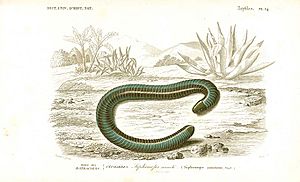Caeciliidae facts for kids
Quick facts for kids Caeciliidae |
|
|---|---|
 |
|
| Siphonops annulatus | |
| Scientific classification | |
| Kingdom: | |
| Phylum: | |
| Class: | |
| Order: | |
| Family: |
Caeciliidae
Rafinesque-Schmaltz, 1814
|
| Genera | |
|
Boulengerula |
|
Caeciliidae is a family of amazing creatures often called common caecilians. They are a type of amphibian, just like frogs and salamanders. However, they look more like worms or snakes. You can find them in warm places like Central and South America, parts of Africa near the equator, and India.
What Makes Them Special?
Even though there are many different kinds of caecilians in this family, they share some cool features. Their skulls are very strong. They have only a few bones, which are fused together. This makes their heads very solid and helps them dig through soil easily. Their mouths are located underneath their nose area. Also, unlike some other animals, they do not have a tail.
How They Grow
Many caeciliids lay their eggs in moist soil. When the eggs hatch, tiny larvae (baby caecilians) come out. These larvae often live in water.
However, some caecilian species are different. Their eggs hatch directly into small versions of the adults. This means they skip the water-living larval stage. Some caeciliids don't even lay eggs! Instead, they give birth to live young, just like mammals.
Different Kinds of Caeciliids
The Caeciliidae family includes many different groups, called genera, and even more species. Here are some examples of the different groups you might find:
- Genus Boulengerula – These are known as Boulenger's Caecilians.
- Genus Brasilotyphlus – You can find these in Brazil.
- Genus Caecilia – These are the common caecilians.
- Genus Dermophis – These are often found in Mexico.
- Genus Gegeneophis – These are sometimes called Forest Caecilians.
- Genus Geotrypetes – These live in West Africa.
- Genus Grandisonia – These are found in the Seychelles islands.
- Genus Gymnopis – These prefer wet forest areas.
- Genus Herpele – These are found in the Congo region.
- Genus Hypogeophis – This group includes the Frigate Island Caecilian.
- Genus Idiocranium – This group includes the Makumuno Assumbo Caecilian.
- Genus Indotyphlus – These are Battersby's Caecilians.
- Genus Luetkenotyphlus – This group includes the São Paulo Caecilian.
- Genus Microcaecilia – As their name suggests, these are Tiny Caecilians.
- Genus Mimosiphonops – These are known as Worm Patterned Caecilians.
- Genus Oscaecilia – These are found in South America.
- Genus Parvicaecilia – These are Columbian Caecilians.
- Genus Praslinia – This group includes Cooper's Caecilian.
- Genus Schistometopum – These are Guinae Caecilians.
- Genus Siphonops – These are called Ringed Caecilians.
- Genus Sylvacaecilia – This group includes the Aleku Caecilian.
See also
In Spanish: Cecílidos para niños
 | Emma Amos |
 | Edward Mitchell Bannister |
 | Larry D. Alexander |
 | Ernie Barnes |

